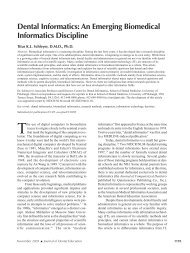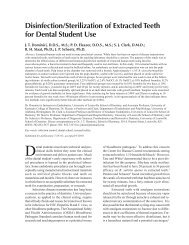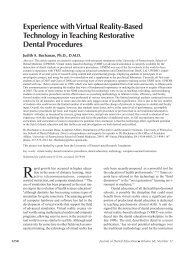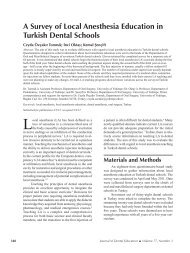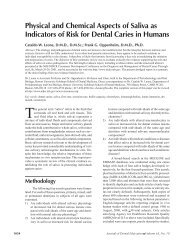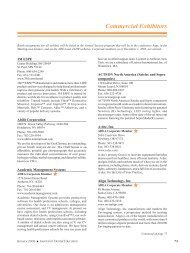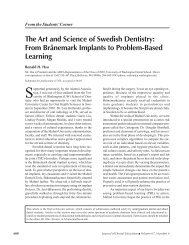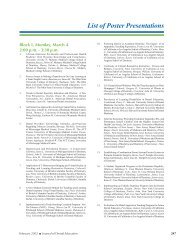Leadership Training for Oral Health Professionals: A Call to Action
Leadership Training for Oral Health Professionals: A Call to Action
Leadership Training for Oral Health Professionals: A Call to Action
Create successful ePaper yourself
Turn your PDF publications into a flip-book with our unique Google optimized e-Paper software.
overcome. Moreover, focus on leadership as a venue<br />
<strong>for</strong> scholarship at both local and national levels is<br />
possible and may ultimately provide a vehicle <strong>for</strong><br />
addressing faculty shortages. 16,17 Since most dental<br />
school applicants are not specifically targeted and recruited<br />
in<strong>to</strong> the profession <strong>for</strong> their desire <strong>to</strong> become<br />
faculty members or leaders, enhanced exposure <strong>to</strong><br />
faculty and adjunctive faculty members in leadership<br />
roles is bound <strong>to</strong> create a climate that sends a very<br />
different message <strong>to</strong> students. We believe that this<br />
exposure may stimulate participants <strong>to</strong> seek career<br />
paths they may not have otherwise considered.<br />
<strong>Leadership</strong> <strong>Training</strong> in<br />
Other Professional Schools<br />
As in dentistry, leadership training in medical<br />
education would be desirable in many facets of<br />
physicians’ career as they interact with patients and<br />
the many facets of the health care industry. In the<br />
article “<strong>Leadership</strong>: ‘They Never Taught Me This in<br />
Medical School,’” Fruge et al. outline a leadership<br />
curriculum <strong>for</strong> fellows at the Texas Children’s Hospital.<br />
18 The approach presented is case-based in seminar<br />
style. O’Connell and Pascoe evaluated eight schools<br />
incorporating medical education <strong>for</strong> the twenty-first<br />
century content: leadership and teamwork. They<br />
believed that leadership training worked well if<br />
incorporated in<strong>to</strong> clinical activities where the skills<br />
could be used. 19 A learning community is another way<br />
<strong>to</strong> integrate leadership in<strong>to</strong> medical education; when<br />
the students get involved in this system, learning is<br />
done by both the students and other members of the<br />
learning community including faculty members and<br />
other stakeholders. 20,21 The most common stated goals<br />
of these organizations are <strong>to</strong> improve communication<br />
and teamwork, establish academic support networks,<br />
and promote leadership development.<br />
Yet other models exist. As in the education of<br />
other professionals, there are many programs that<br />
students can be involved in <strong>to</strong> learn better leadership<br />
skills 22,23 and many articles that address the needs and<br />
programs <strong>for</strong> medical education and medical resident<br />
education. 24,25<br />
Like medicine and dentistry, as business school<br />
graduates enter the work<strong>for</strong>ce, leadership training<br />
in the corporate world is often tailored <strong>to</strong> suit niche<br />
needs. These needs often represent the distinctive<br />
management and leadership approach of the organization.<br />
One large organization with a highly evolved<br />
leadership program regularly updates this program <strong>to</strong><br />
remain current and relevant. As with most corporations<br />
that have professional development programs,<br />
most include some elements relating <strong>to</strong> promoting and<br />
nurturing leaders. Often companies, especially smaller<br />
companies, use outside-developed, more generic programs<br />
that were not necessarily tailored <strong>to</strong> represent<br />
the culture and ethos of the specific company.<br />
Business schools are often seen as leaders in<br />
general management skills and in leadership. Bennis’s<br />
pioneering work laid the groundwork <strong>for</strong> many<br />
of the modern re<strong>for</strong>ms in business education. 26 His<br />
approach includes recognition of the role of judgment<br />
and emotion in decision making and the importance<br />
of ethics. Still, many business schools <strong>to</strong>day have<br />
been criticized <strong>for</strong> not teaching effective leadership,<br />
so a new approach is required focusing research on<br />
phenomena and problems of enduring importance<br />
and building curricula that are evaluated, in part, by<br />
how well they actually prepare students <strong>to</strong> be effective<br />
in practicing the profession.<br />
Increasingly, corporations are developing their<br />
own future generations of leaders through internally<br />
developed educational programs. These programs<br />
seek <strong>to</strong> capitalize on their own successful leadership<br />
and results in order <strong>to</strong> drive these skills further down<br />
the management team. Many of these programs have<br />
a structured curriculum covering the many management<br />
disciplines, taught by managers from across the<br />
corporation. These programs often rely on reviewing<br />
and learning from the successes of the company in<br />
order <strong>to</strong> teach desired actions and behavior. Thus, the<br />
next generations of leaders are nurtured within the<br />
framework of a successful corporation.<br />
Examples of <strong>Leadership</strong><br />
<strong>Training</strong> <strong>for</strong> Dental and<br />
Dental Hygiene Students<br />
What should leadership training in dentistry<br />
be in the context of a need <strong>for</strong> oral health leaders?<br />
Is the best practice <strong>for</strong> dentistry <strong>to</strong> look <strong>to</strong> business<br />
schools or other professional programs <strong>for</strong> leadership<br />
content? Is management training leadership training?<br />
Should the focus be on leading a dental practice<br />
or training dentists/dental hygienists <strong>to</strong> be leaders<br />
at local, state, and national levels? Is a research<br />
experience leadership training in and of itself? We<br />
assert that the need is much greater and goes beyond<br />
188 Journal of Dental Education ■ Volume 76, Number 2



